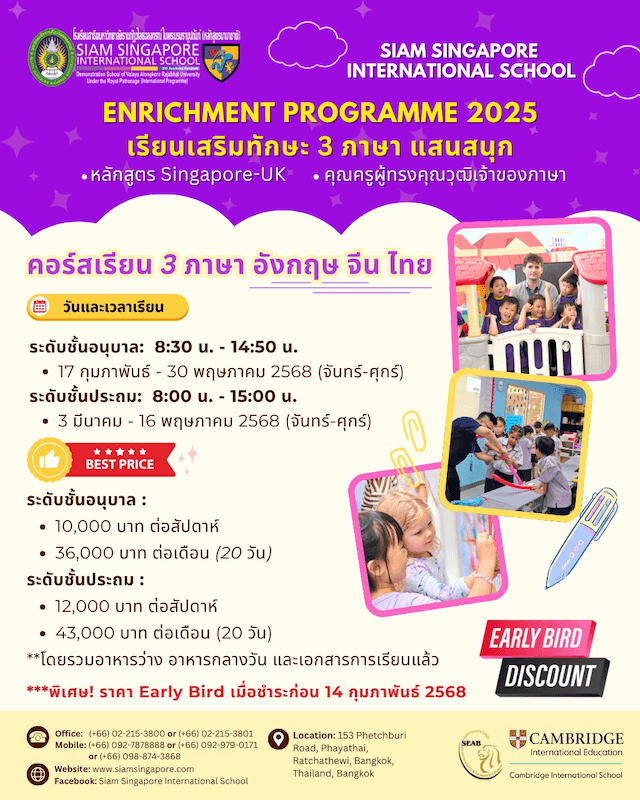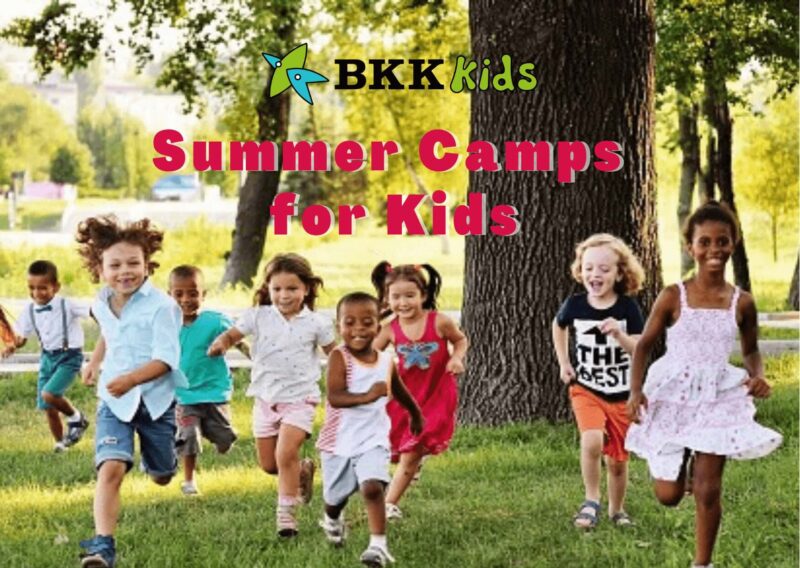With the recent spike in harmful particulates in Bangkok’s air as well as pressing topics such as plastic pollution and other adverse environmental issues, everyone is naturally concerned about the health impact, especially on our families. At Raintree International School in the Sathorn area, several initiatives have been introduced, augmenting the school’s mission to provide a green healthy environment for our children and the wider community.
“At Raintree School, we are privileged to have a large natural green space at the very core of our facility design,” explains Khun Mai Chalitaporn, the school’s founder and director.“Our ‘S’ curve building flows around two clusters of old-growth Raintrees, enabling all our classrooms to look out on to a rich green area teeming with natural life. The garden grounds and natural building materials promote a sense of calmness throughout the premises.”

The Raintree has also been identified by Mahidol University as one of the highest ranked trees at collecting dust from the atmosphere; hence; the garden provides the community with a cleaner environment, which is very much needed now.
In addition to inspiring the school’s name and providing a healthier setting for students, the Raintree serves a fitting symbol for the founder’s goal to enable long-term change, encouraging the children to take on the great challenge of our time: to reduce our carbon footprint. “The Raintree thus stands as a symbol of our goal to address and support both our children’s development and conservation issues,” says Khun Mai, adding, “By educating our most precious resources, our children, encouraging them to be young environmentalists with a lasting love for and dedication to nature so that they will take care of the Earth and its natural resources when they grow up.”
Current school projects that are part of the outdoor curriculum include:
- Planting trees, focusing on the theme of ‘Happiness Day’; after all, “Trees are sanctuaries,” wrote the German poet and philosopher Herman Hesse. “When we have learned to listen to trees… that is home. That is happiness.

- Building and protecting insect and animal habitats, encouraging children to look for and observe the different types of insect and animal life found in the garden. Bird boxes are provided for nesting and specific plants attract butterflies and snails. Kids also learn how to respect and take care of the birds and squirrels, including responsible and proper feeding.

- Supporting broader initiatives, such as turtle conservation, where students learn about turtles and help raise funds through an art auction to donate to this cause
- Understanding the importance of healthy soil, compost and worms through the ‘Wormery’ project, teaching children how to recycle food waste into compost with the help of garden worms and how vital it is to keep soil healthy in order to grow nutritious food

- Organic gardening, showing young children how fruits and vegetables germinate, grow and thrive before they are harvested through the ‘Seed to Plate’ project; kids also get to cook and eat a delicious plate of home grown vegetables, teaching the relationship between humans, plants and food (and instil a love for healthy, fresh grown produce!)
“At Raintree we not only want our children to explore who they are and where their food comes from, but build an awareness of the interconnectedness of all living things. In our community, we also foster health conscientious, planet-responsible living. Concepts of recycling, reusing and reducing are evident throughout our daily program and routine,” adds Khun Mai.
Such initiatives include:
- Recycling in the form of separating garbage and recycling children’s food waste during their daily routine
- Reducing plastic use within the learning environment by using more recycled or natural teaching materials, including cutting down on laminated materials that are often used abundantly in schools



- Decreasing plastic / paper waste in daily routines by requesting that families use a washable wet bag (for any soiled clothing at school) and eliminating the single use plastic bags. Art portfolios to our students’ families are sent home in a Raintree fabric bag.
- Reusing cups and bottles such as introducing a Raintree tumbler at the nearby coffee shop, so parents and staff can avoid using single use coffee cups. The school has also switched from offering bottled water to parents to using a water dispenser.

- Reducing traffic congestion and being mindful of the growing numbers of cars within the city, and the pollution they cause; this encompasses a carpooling system and offering priority parking for carpool parents. The admission policy prioritises families who live within the area and those that carpool.
“Raintree is committed to providing a green healthy environment for the children and wider community. This commitment is about nurturing habits of sustainability and a connection with nature. We want this to be an integral part of our community’s everyday life, so we aim to get children and parents to see potential in recycled materials, think about sources of materials, understand waste and so much more,” says Khun Mai.
Each initiative is neither difficult, nor drastically disruptive to anyone’s daily routine whether in school or at home – “Why don’t you take your first step to becoming green too?”
For more information about Raintree International School:
Website: www.raintreethailand.com
Email: hello@raintreethailand.com
Tel: 063-230-8000














